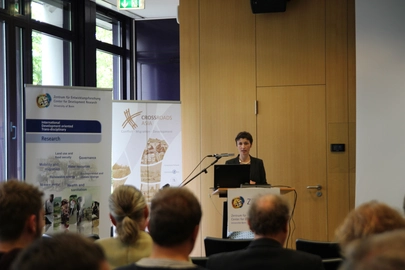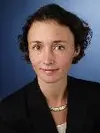Interview with Anna-Katharina Hornidge, new Director of ZEF's Department of Political and Cultural Change.
July 31, 2014.
"I can build on a very strong team". Interview with Anna-Katharina Hornidge, new Director and Professor of ZEF’s Department of Political and Cultural Change as of August 1, 2014.
You have been appointed director at ZEF for the coming three years. Since ZEF stands for Center for Development Research, what are your ideas about the concept of development?
Current definitions of development range from strongly economic focused ones to those focusing on human well-being or happiness as for example employed by Bhutan. What they all have in common is to consider ‘development’ a form of ‘positive’ change. However, it depends on who defines what is ‘positive’. State organizations are likely to put a different emphasis than subsistence farmers, international donors or those who are supposed ‘to be developed’. ‘Development’ thus acts as an open, boundary concept, allowing for a multitude of different definitions and offering a platform for bringing a variety of actors together. This is important since ‘development’ is never a linear process, but instead can only be an agglomeration of multiple approaches and actions taken towards hopefully overlapping definitions of a ‘better’ future. Yet, it also means that this open space is filled more actively by more influential (powerful) actors. They shape the discussions on how to define ‘development’ and what should be considered as such more loudly than less influential actors. It is our job at ZEF, and especially in the social science department, to keep a critical eye on current development discourses, agenda settings and activities.
You wrote your doctoral thesis in 2007 in Berlin and Singapore on the construction of knowledge societies in Germany and Singapore, and your habilitation on global discourses of knowledge and their local consequences in Southeast and Central Asia. Why this fascination with knowledge?
The fascination with 'knowledge' lies in its nature. Similar to 'development’ it is quite an open concept that nevertheless guides human action worldwide. 'Knowledge' ranges from shared belief systems to very tangible forms of technical or institutions innovations. Furthermore, it includes science policy questions. 'Knowledge' as a research theme thus links very different topics and disciplines relevant to development research and therewith to ZEF. In my work, I adopt Berger/Luckmann's definition of knowledge, regarding everything as ‘knowledge’ that is regarded as such in and by a society. Whatever we attach particular meaning to, place emphasis on and regard worth ‘knowing’ and knowing more about is crucial for defining where we want to go, thus creating an image of a different, to be pursued future. Irrespective of whether we conduct research on scientific knowledge production or farmer-driven idea development, in the end we always study how different actors perceive their future and how their actions are guided towards it. This is where it becomes relevant to development research.
Your geographical research focus shifted in the course of the past eleven years from South East Asia to Central Asia. Was this shift coincidence or a deliberate choice?
I studied Southeast Asian Studies with a Master’s degree in Indonesian language. I was (and still am) convinced that good qualitative and quantitative social science research requires local language skills and cultural expertise. Yet, at the same time, we need strong conceptual and methodological groundings. Collecting expertise in different regions, on different, but related topics, challenges and eventually strengthens our conceptual and methodological expertise. By including Central Asia, mainly Uzbekistan and Tajikistan, in my regional focus I had the opportunity to gain experience in project coordination and management. First, I coordinated the social sciences in a BMBF-funded and ZEF-led project in Uzbekistan, then I led two smaller projects in Tajikistan and since 2012 I have been coordinating the Germany-wide competence network ‘Crossroads Asia’.
You have been working at ZEF for eight years now. ZEF has been trying to go a step beyond interdisciplinary research towards trans-disciplinary research. What do you think has been achieved in this respect and what still needs to be done?
Trans-disciplinarity as a research approach was developed in the late 1990ies; in Europe it was promoted at an international conference on trans-disciplinarity in Zürich in 2000. So when ZEF indulged in trans-disciplinary processes from 2006 onwards, the whole concept was still quite young. I think we have contributed to these discussions quite substantially. On the one hand by testing and developing trans-disciplinary research approaches in non-western contexts, and on the other by building inter- and trans-disciplinary teams as well as capacities and educating (and socializing) a generation of researchers and practitioners into inter- and trans-disciplinary research environments. Ideally, stakeholders but also policymakers are to be included in a research process right from the start, meaning from the moment of defining what the research problem in the local setting is and how it could be tackled. This posed a challenge in the beginning as we wanted to include trans-disciplinary components into ongoing projects. Yet, by now, we include our stakeholders and potential end users right from the beginning of the proposal drafting process. The aspect of growing into these processes jointly with our partners worldwide is very important and valuable to our ongoing and future work.
What are your plans, what will be your foci, your goals for the coming three years?
I can build on a very strong team in ZEF’s Department of Political and Cultural Change. We have our core themes and have been working on several world regions developing substantial expertise over the past years. Yet, what I would like us to do in the coming three years is to put the research we conduct on different themes, in different world regions, and on different scales into stronger interaction with each other. We can do this by developing our current implicit focus on different change processes into an inter-linking frame. We work on environmental change processes such as climate change in Western Africa and Southeast Asia, as well on socio-economic processes in Central Asia and the Caucasus. Irrespective of the type of change process and region studied, we see that people mobilize different types of knowledge, develop their own ideas and innovations in creative manners in order to cope, adapt and live with these challenges and the changes they experience. People move from rural to urban sites, where access to land, water and health facilities becomes an issue; and questions of governance, institutions and the actors involved play a role in all of these topics and the exchange on them is crucial. It also means that we will continue working on the local level and conducting ethnographic research in addition to including quantitative elements as contribution for example to multi-agent based models in our interdisciplinary projects with the economic and natural sciences at ZEF.
What is the specific contribution of social sciences to ZEF’s research agenda?
I see it as one of the tasks of the social sciences in interdisciplinary projects to encourage and ensure continuous processes of reflection on development discourses, on research ethics and practice, on the way we build and foster trans-disciplinary research cooperation, and how we plan and implement research. I want us to encourage methodological debates - also in interaction with our local research partners. Yet, finally it is our task to use the locally collected and empirical research material in order to abstract from it and develop non-western, empirically-based mid-range concepts along Robert Merton's middle-range theories. Together with our local partners we want to contribute to conceptual as well as methodological debates and to reducing the still existing western/northern bias of the social sciences as practiced in the epistemic centers of the world. This is what we can offer. We have the empirical material and the analytic capacities for this. So let’s take this further.
Thank you for this interview!
Watch the video <link http: www.zef.de external-link-new-window external link in new>here



